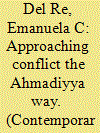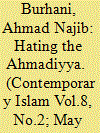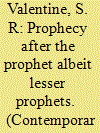|
|
|
Sort Order |
|
|
|
Items / Page
|
|
|
|
|
|
|
| Srl | Item |
| 1 |
ID:
131480


|
|
|
|
|
| Publication |
2014.
|
| Summary/Abstract |
The role and incidence of the Ahmadiya community in Israeli society, with its around 2,000 members, is not related to the dimension of the community, its religious activities or its dissemination on the territory. It is related to the strong social and political engagement of the community not only in religious but also in civil society activities where it resides, despite all the difficulties that derive from its disputed role in Islam. The Ahmadiyya community in Haifa constitutes a relevant example of contribution to peaceful and productive coexistence. Haifa itself is characterized by a very interesting social and political climate, by which it is considered a "model" of coexistence in Israel, despite the fact that many contrasts and contradictions persist, such as forms of discrimination and inequalities. The civil society is particularly active, and institutions and NGOs devoted to the Arab-Jewish dialogue are many. Religious and political leaders communicate and participate together in various events, where their openness and mutual respect are intended to symbolize harmony with the intent of this being mirrored by the whole society. The Ahmadiyya Community plays an active role in this evolving process. The author, who has carried out qualitative research in Haifa to film a scientific documentary on the Holiday of Holidays and the validity of the Haifa model of coexistence, applied participant observation in the framework of grounded theory to analyze the role and impact of the Ahmadiyya community in the complex Israeli context, also on the basis of extensive in depth interviews with community members and leaders
|
|
|
|
|
|
|
|
|
|
|
|
|
|
|
|
| 2 |
ID:
131483


|
|
|
|
|
| Publication |
2014.
|
| Summary/Abstract |
As the Moroccan American scholar Anouar Majid reminds us on the first page of his latest book, Islam and America: Building a Future without Prejudice, we are drowning in information about the relationships of Muslims and the West but are not yet being rescued by this expanding corpus. This and his earlier We are All Moors come as close to any books I have read recently that hold out promise for such a rescue, at least in the forward-thinking rhetoric that outlasts the general effluvium of political punditry. Majid, who came to the United States in 1983, is currently director of the Center for Global Humanities at the University of New England in Portland, Maine. His training in literature has well prepared him to probe novels, poems, travel accounts and political manifestos for past reflections on how Islam has been perceived since the founding of the United States. His grasp of American history and a
wide range of historical sources consulted is a welcome contribution to a field where partisan political books stock major bookstores and reflective academic studies are read almost exclusively by a small circle of fellow academics. Both of these books deserve a wider readership that I fear they will not receive in the flood of punditry on Islam vs. the West
|
|
|
|
|
|
|
|
|
|
|
|
|
|
|
|
| 3 |
ID:
131481


|
|
|
|
|
| Publication |
2014.
|
| Summary/Abstract |
Religious diversity and pluralism is commonly understood within the context of the relation between various religious traditions, not within a single religious tradition. This limitation of the boundary of religious pluralism could overlook the fact that conflict within a single tradition can be bitterer and more disastrous than conflict with other religions. In the last decade, for instance, the Ahmadis in Indonesia have become victims of constant attacks. This article, therefore, intends to study the place of the Ahmadiyya in the context of religious pluralism in Indonesia by answering the following questions: Why was the treatment of the Ahmadis in recent years by Muslims more vitriolic than their treatment of non-Muslims? What is the nature and quality of life for people who have been excluded from a 'normal' religious identity in a time when religious attachment is a necessary fact for that society? Why did the attacks on the Ahmadiyya occur in the present regime, not during the past authoritarian one? This article argues that the charge of heresy issued by Muslim institutions put the Ahmadiyya in liminal status; they are in the zone of indistinction between Muslims and non-Muslims. This makes them vulnerable to persecution since they have been deprived of their rights as Muslims, while their rights as non-Muslims are still suspended. Non-Muslims, particularly ahl al-kit?b (People of the Book), have been accepted theologically in Muslim society, but there is no place of tolerance for heretics. The rise of intolerance in Indonesia parallels the rise of religious conservatism after the fall of Suharto in 1998.
|
|
|
|
|
|
|
|
|
|
|
|
|
|
|
|
| 4 |
ID:
131482


|
|
|
|
|
| Publication |
2014.
|
| Summary/Abstract |
In this paper we explore the ways in which the Indonesian Front Pembela Islam (Islamic Defenders Front-FPI) uses hate speech and demonization to legitimize violent attacks on organizations and individuals it considers to be sinful or religiously deviant, and civil discourse to establish credibility and respectability.
We argue that the use of a discursive frame established by fatwa (legal opinions) issued by the semi-official Majelis Ulama Indonesia (MUI-Indonesian Council of Muslim Scholars) and tacit support from powerful political factions enable FPI to conduct campaigns of demonization and violence with near impunity and to avoid being labeled as a terrorist organization. We elaborate on a distinction between what the Center for Religious and Cross-Cultural Studies (CRCS) at Gadjah Mada University calls the two faces of FPI (Bagir et al. 2010a). The CRCS report distinguishes between civil and uncivil modes of FPI discourse and praxis. The civil mode seeks to establish the organization's credibility in the public sphere. It presents FPI as the ally of authorities in attempts to control deviance and assisting those in need, especially victims of natural disasters.
|
|
|
|
|
|
|
|
|
|
|
|
|
|
|
|
| 5 |
ID:
131479


|
|
|
|
|
| Publication |
2014.
|
| Summary/Abstract |
The Ahmadiyya Jama'at, a little known reform movement within Islam, has the majority of its estimated 12 million members living in Pakistan. Believing that there can be prophecy after the prophet Muhammad, albeit lesser prophets, the Movement has been subjected to vehement opposition from mainstream Muslims who regard Muhammad as the seal and the last of the prophets. This essay considers the history of the Ahmadiyya Jama'at in Pakistan, the legal and political context since partition in 1947, the Movement's beliefs and practices and the reasons why there is ongoing persecution of the group in Pakistan today. Drawing on personal contact with the Ahmadi in the UK and America and visiting the Ahmadi at their centres at Rabwah, Pakistan, and Qadian, India, the author discusses the discrimination and marginalization faced by Ahmadi under the aforementioned legislation. The paper concludes with tentative suggestions and recommendations.
|
|
|
|
|
|
|
|
|
|
|
|
|
|
|
|
|
|
|
|
|